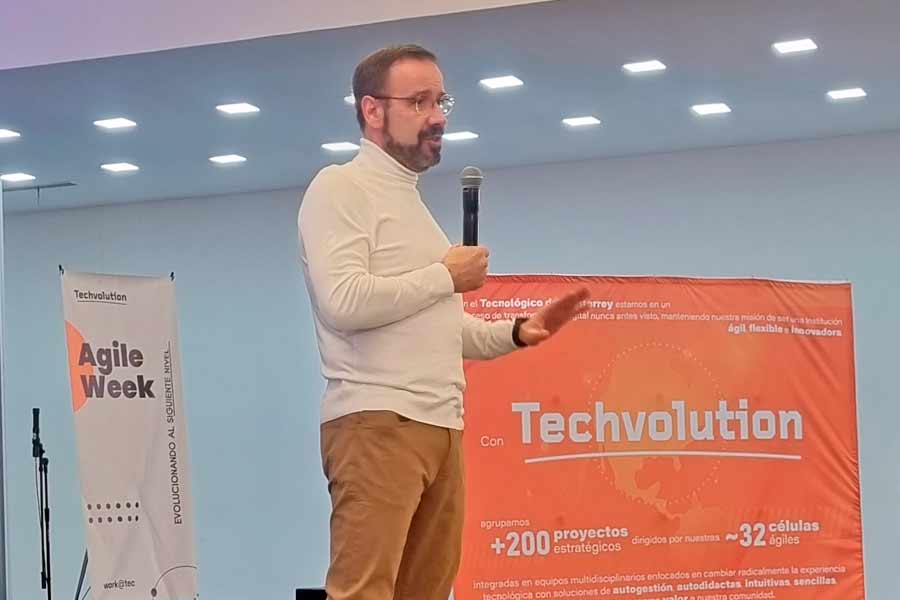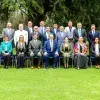“In 10 years’ time, Tecnológico de Monterrey has to be a software integrator offering academic services.”
This is what the Tec’s new Vice President of Digital Transformation, Carles Abarca, said in an interview with CONECTA when asked about his vision for the institution in the age of digital technologies and Artificial Intelligence.
“In the future, I’d like the Tec to be recognized in the sector as the best educational institution at making use of technology in order to transform students’ lives,” Abarca said.
Carles Abarca explained that many institutions in the education sector have used technology as a complement to student training, but he said that technology is essential to their operation nowadays.
“It’s something that happened a few years ago in other sectors. For example, where I come from in banking, it happened over 15 years ago. In that case, technology is ‘core business’ because customer acquisition and service are carried out digitally; everything happens in that context,” he noted.

The director also considers that the Tec, as an educational institution, is in a phase in which more and more students will consume products and services in the digital space.
This is where the use of tools such as the Metaverse or Web3, which the Tec already operates, will create opportunities for new educational experiences, he said.
“In the future, I’d like the Tec to be recognized in the sector as the best educational institution at making use of technology.”
The strategy for harnessing technology
According to Carles Abarca, the idea that technology is central to education means we must understand that management of the entire the institution will depend completely on technology, from enrollment to academic monitoring of students.
“We’re already in the process of turning technology into the core of our activity; we lack the level of formal structure present in sectors that have already gone through this process.
“This hasn’t happened yet, but we have to prepare for it, give ourselves the opportunity to build technology management processes that are more aligned with the major stakeholders in the digital revolution,” said the vice president.
As an example, he mentioned the processes for releasing and validating software, which they will seek to make fully automated processes that continuously evolve, just as companies such as Google, Meta, or Amazon have done.

Technology at the service of Tec audiences
The aim envisioned by Abarca for the institution’s future is for technology to become a distinguishing feature in the service offered by the Tec to its audiences.
“I’m certain that Tec is already recognized around the world for training extraordinary professionals or future technology professionals. The goal now is for it to also be world-renowned as an academic point of reference for technology use.”
He pointed out that teams can be built from the talent that’s being developed at the Tec to develop new technology enablers and benefits for the institution’s users. He used a technology known as Mobile First as an example.
“We’re already in the process of turning technology into the core of our activity.”
“Within a year, we need to have a mobile application for students that gives them access to timetables and grades, to complete the enrollment process, pay for services, and to be a unique identification for going through a turnstile, reserving a classroom, or using digital services.”
Tec audiences include students, staff, professors, advisors, and parents, for whom the institution seeks to provide top technology experiences through strategies such as Techvolution.
“It’s very important to put technology at the service of our audiences, therefore all management in the coming years must be focused on offering them first-class technology experiences,” he added.

- 3 actions for offering top technology experiences.
Abarca said that there are 3 fundamental objectives that the institution must set itself in order to offer these top tech experiences:
- Operational excellence
“A good experience is immediately ruined by a flaw, an incident, or an obstacle. Therefore, our first objective is to establish operational excellence through smart use of technology.”
- Automation
“We must get rid of unnecessary steps or, failing that, automate them. A large part of our operation as an institution still depends on very manual processes, and we must free ourselves of that manual work to allow people to focus on more valuable tasks.”
- Be pioneers in technology
“In addition to operational excellence and automation, the Tec’s status, prestige, and reputation mean it is also expected to become a pioneer, someone who tests new ways of using technology for the first time in the sector.”
As part of this innovation, the director highlights the importance of accepting the challenge of understanding and adapting to emerging technologies, such as new algorithms developed with Artificial Intelligence like Chat GPT.
“The impact of AI in academia will be enormous. It’s also a challenge because students will use this type of instrument. We must understand and adapt to these technologies and harness them,” added the vice president.

The path to digital transformation
The Vice President of Digital Transformation pointed out that there will be a focus on understanding and setting priorities over the next 6 months, which he defines as brilliant basics.
“Before starting to innovate, we have to make sure that the pillars, the technology basics, are solid and for that we have to build good technology risk management and put together a good cyber defense strategy,” he said.
Abarca pointed out that the Tec’s reputation and what it represents as an institution mean it’s necessary to reinforce the Tec’s cybersecurity, as well as elements of its information technology structure.
“It’s about identifying elements and points of technological risk, reinforcing our cyber defense strategy, and reorganizing the IT team to begin moving towards becoming that organization with better software integration and continuous development,” he added.
“The Tec is also expected to become a pioneer, someone who tests new ways of using technology for the first time in the sector.”
With this strategy, the director believes it is possible to begin the next academic year with a different organization, with core functions that will serve to build the foundations on which the future will be built.
“We have also convened a Digital Route event, to start working on the design of the evolution towards that world of digital transformation over the next 3 years, but the starting point is to consolidate the basics well to build something secure.”
Carles Abarca, the Tec’s new Vice President of Digital Transformation, has a career spanning 20 years in the world of Information Technology (IT). He took on the role in January 2023.
ALSO READ:





